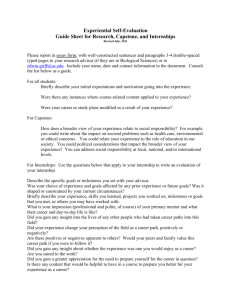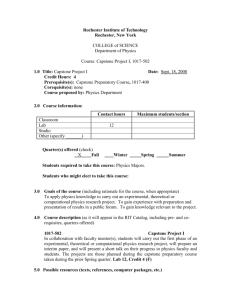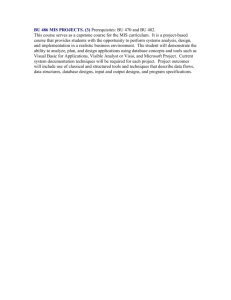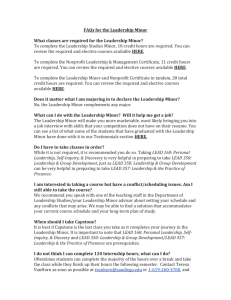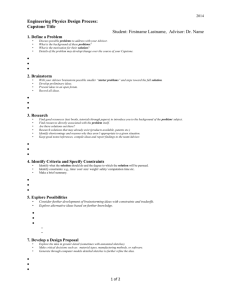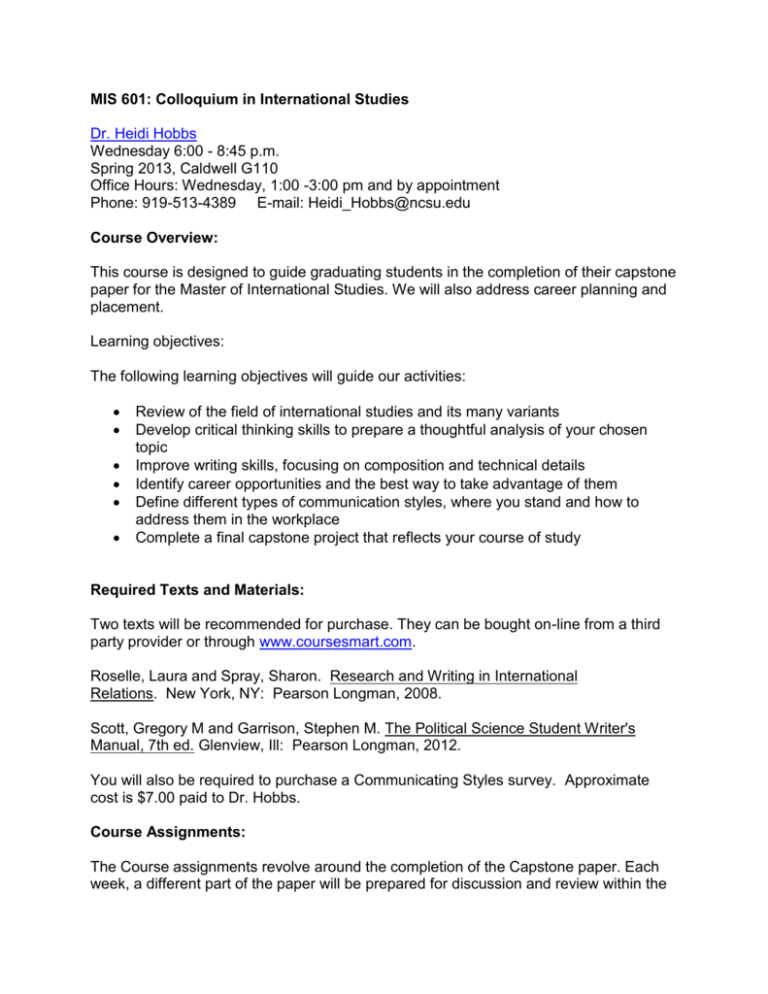
MIS 601: Colloquium in International Studies
Dr. Heidi Hobbs
Wednesday 6:00 - 8:45 p.m.
Spring 2013, Caldwell G110
Office Hours: Wednesday, 1:00 -3:00 pm and by appointment
Phone: 919-513-4389 E-mail: Heidi_Hobbs@ncsu.edu
Course Overview:
This course is designed to guide graduating students in the completion of their capstone
paper for the Master of International Studies. We will also address career planning and
placement.
Learning objectives:
The following learning objectives will guide our activities:
Review of the field of international studies and its many variants
Develop critical thinking skills to prepare a thoughtful analysis of your chosen
topic
Improve writing skills, focusing on composition and technical details
Identify career opportunities and the best way to take advantage of them
Define different types of communication styles, where you stand and how to
address them in the workplace
Complete a final capstone project that reflects your course of study
Required Texts and Materials:
Two texts will be recommended for purchase. They can be bought on-line from a third
party provider or through www.coursesmart.com.
Roselle, Laura and Spray, Sharon. Research and Writing in International
Relations. New York, NY: Pearson Longman, 2008.
Scott, Gregory M and Garrison, Stephen M. The Political Science Student Writer's
Manual, 7th ed. Glenview, Ill: Pearson Longman, 2012.
You will also be required to purchase a Communicating Styles survey. Approximate
cost is $7.00 paid to Dr. Hobbs.
Course Assignments:
The Course assignments revolve around the completion of the Capstone paper. Each
week, a different part of the paper will be prepared for discussion and review within the
class. Failure to meet the deadlines as posted may result in an unsatisfactory grade for
the course.
Academic Integrity is expected at all times. Cheating and plagiarism are clearly defined
by the NC State Office of Student Conduct and will not be tolerated.
Students with disabilities should make an appointment with the instructor to arrange
academic accommodations.
Web Information:
An interactive version of this syllabus can be found at faculty.chass.ncsu.edu/hobbs.
There is also a message board for this course where you can communicate with your
fellow students. It can be found at http://moodle.wolfware.ncsu.edu.
Procedures and Deadlines:
Master's Plan of Graduate Work: By the beginning of the semester, all students must
complete a Master's Plan of Graduate Work form that lists all of the courses they have
taken or will be taking to fulfill the requirements for MIS degree along with the name of
their primary advisor. These forms must be submitted through SIS for my review and
signature if all requirements are met.
The Graduate School has a SIS Training Manual for graduate students to walk you
through the online steps to file your plan of work: http://www.ncsu.edu/grad/faculty-andstaff/docs/GRAD-SIS-training-manual-students.pdf.
Failure to file your plan of work by the first week of classes can result in your being
dropped from the Capstone class for the semester.
Advisors/Committee: Each student will have one primary advisor who will oversee the
content and completion of the Capstone paper. A second advisor may be identified
early in a student's program of study and will also read and comment on the Capstone
paper. Three visits with your primary advisor are required and must be documented for
satisfactory completion of the course.
Oral presentation: A symposium will be scheduled within the confines of MIS 601 at
which time student papers will be grouped into panels based on topic and presented to
the public (faculty and classmates). Either I or another professor will serve as the Panel
Chair. This symposium will take place on the last class sessions.
Grade requirements: Students will get credit for the course upon completion of their
paper and its approval by their primary advisor with a Satisfactory (S) grade. Failure to
complete the various assignments each week and the final paper will get an
Unsatisfactory (U) and must repeat the course. The Capstone adviser will participate in
this process, as well as the instructor, and must approve the final project.
Graduation Paperwork requirements: The deadline to apply for graduation and be
cleared for Spring 2013 is Friday, March 29, 2013 and must be filed online. To clear our
holds, your "Patent Agreements" should be filed online and Foreign Experience
Certification Forms should be signed and in your file by March 15. The foreign language
requirement must also be met prior to graduation http://fll.chass.ncsu.edu/graduate/cert-grad.php.
University policies for student responsibilities and disabilities
“Students are responsible for reviewing the PRRs which pertain to their course rights
and responsibilities. These include: http://policies.ncsu.edu/policy/pol-04-25-05 (Equal
Opportunity and Non-Discrimination Policy Statement),
http://oied.ncsu.edu/oied/policies.php (Office for Institutional Equity and Diversity),
http://policies.ncsu.edu/policy/pol-11-35-01 (Code of Student Conduct), and
http://policies.ncsu.edu/regulation/reg-02-50-03 (Grades and Grade Point Average).
Academic Integrity is expected at all times. Cheating and plagiarism are clearly defined
by the NC State Code of Student Conduct and will not be tolerated.”
“Reasonable accommodations will be made for students with verifiable disabilities. In
order to take advantage of available accommodations, students must register with
Disability Services for Students at 1900 Student Health Center, Campus Box 7509, 919515-7653. For more information on NC State's policy on working with students with
disabilities, please see the Academic Accommodations for Students with Disabilities
Regulation (REG 02.20.01)."
Capstone Paper Overview and Outline:
The Capstone paper is designed to integrate concepts, theories, or insights MIS
students have gained from their course work and to use them as a basis for reflecting
upon and analyzing their international experience or an international problem of their
choice. In terms of length, the Capstone paper fall somewhere between a term paper
and a master's thesis. A master's thesis normally entails a general review of relevant
literature and reporting the findings from an original research project.
The length of the papers may vary considerably, but a good target range would be
between 25 and 40 pages (double-spaced, 12 point font). The paper should be correctly
documented. The text should be well organized, edited for readability, and free of
grammatical errors and misspellings. It may include tables, graphs, and appendices as
appropriate.
Below is a suggested outline, but depending upon your topic you may choose to
organize your paper differently in consultation with me and your faculty advisor.
I. Introduction: What is your topic? Problem Statement
Overview of your paper and how it is organized
II. Relationship to Course Work, Related Research
How have your courses related to your understanding of this topic? Be specific about
practical information, theories and approaches, not the specific classes.
III. Research Design
What specific questions are you asking and how will you address them?
IV. Data Analysis
Here might be a case study of your topic or analysis of data related to your topic. You
might incorporate personal practical (internship) or overseas experiences that relates as
well.
V. Conclusions, Policy Recommendations
What direction do you see this topic going in the future? Are there recommendations
you might make?
Do you have further interests in this subject area and how will you capitalize on those
interests?
Course Outline:
Week 1: Overview of MIS graduation requirements and Capstone paper expectations
Jan. 9
Week 2: Project overview
Jan. 16
Each student will bring a two page summary of their capstone project for class
circulation and discussion.
Reading: Scott and Garrison, Part One. Roselle and Spray, Part I.
Week 3: Bibliography
Jan. 23
Each student will bring in an annotated bibliography of at least 10 sources to be used
for paper. Bibliographies should be posted to Moodle site before class for discussion.
Reading: Scott and Garrison, Parts Two and Three. Roselle and Spray, Part II.
Week 4: Outline
Jan. 30
Each student will bring in an extended outline of project for discussion.
Reading: Scott and Garrison, Part Four. Roselle and Spray, Part III.
First Capstone advisor(s) consultation signature due
Week 5: Partial Draft Due, Communicating Styles Survey Distributed
Feb. 6
Each student will bring a partial draft of at least 5 pages for circulation and discussion.
Reading: Scott and Garrison, Parts Five and Six.
Week 6: Communicating Styles Survey Due and Discuss Results
Feb. 13
Week 7: Meet with Capstone advisor and get consultation signatures - No class
Feb. 20
Week 8: Panel development – meet as class
Feb. 27
Second Capstone advisor(s) consultation signatures due
Week 9: Spring Break
March 6
Week 10:
March 13
Progress on Extended Drafts evaluated and individual appointments
This week and the following week, students will make individual appointments with the
class instructors and their advisors for consultation on preparing final papers. Students
should have as much of a completed draft as possible, with a target of 20 pages by their
appointment date. One hour for each consultation should be reserved with each.
The order for this review should be as follows:
1. Draft 20 double spaced pages, include intro
2. Meet with Dr. Hobbs or Dr. Crane-Seeber
3. Revise as per meeting with Dr. Hobbs or Dr. Crane-Seeber
4. Meet with advisor
Week 11: Progress on Extended Drafts evaluated and individual appointments
continued
March 20
Week 12: Revising and editing strategies
Oral presentation guidelines and abstract requirements presented
March 27
Oral presentation guidelines and abstract requirements will be reviewed
Symposium program will be finalized
Abstracts must be posted to Moodle by class today, with final title of paper.
Hand-outs for revising and editing that expand on these topics http://www.ncsu.edu/tutorial_center/writespeak/Revising.htm.
Third Capstone advisor(s) consultation signature due
Week 13: ISA Conference – no class, Continue paper preparation
April 3
Week 14: Review papers and prepare for symposium
April 10
Paper progress will be assessed and final preparations made for symposium.
Oral presentation will be practiced during this meeting
Week 15: Symposium
April 17
Week 16: Symposium
April 24
Final Papers due to Faculty Advisors by Friday, May 3, 2013.
Graduation will be Saturday, May 11, 2013.


